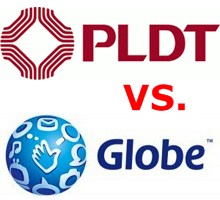Mandating IP Peering By ISPs
 Here is another situation where the two (2) leading Internet service providers (ISPs) in our country are on the different sides of the fence. Globe Telecom is urging the National Telecommunications Commission (NTC) to order all Internet service providers (ISPs) in the Philippines to deliver and receive data traffic between domestic end-points free of Internet peering charges and without passing the traffic across the national border while PLDT said that compelling ISPs to connect via a single Internet exchange as proposed in the draft NTC order may create a bottleneck that could hamper rather than raise the service quality of the ISPs.
Here is another situation where the two (2) leading Internet service providers (ISPs) in our country are on the different sides of the fence. Globe Telecom is urging the National Telecommunications Commission (NTC) to order all Internet service providers (ISPs) in the Philippines to deliver and receive data traffic between domestic end-points free of Internet peering charges and without passing the traffic across the national border while PLDT said that compelling ISPs to connect via a single Internet exchange as proposed in the draft NTC order may create a bottleneck that could hamper rather than raise the service quality of the ISPs.
Globe Telecom, in its position paper, explained that IP peering is similar to interconnection among public telecommunications entities for voice and text messaging except that it applies to the Internet space where subscribers and/or applications of one ISP connect to the subscribers and/or applications of another ISP through an Internet exchange. The second largest telecom company in the country said there is no reason why domestic Internet traffic should first be routed internationally before being transmitted back to the Philippines to its destination network.
PLDT officials said proponents of IP peering such as Globe Telecom have erroneously compared this to interconnection for voice calls and SMS between phone carriers, except that in this case, interconnection applies to Internet traffic. The company argued that unlike conventional phone systems where calls are handled using carefully planned routing tables downloaded into switching systems, the routers of Internet use a self-discovery process to determine the connectivity of the network and decide themselves where to send traffic. The telecom giant added that rather than use direct high-usage peering or redundancy throughout the network which is the rule for telephone systems, the Internet achieves reliability via a mesh network rich in alternate routes.
In the above-described positions, NTC is again caught between two warring factions of completely contrasting recommendations but as the government regulating agency it must decide on what is best for the Internet users. There were many situations in the past that they did so but the party who were not favored by the agency’s circulars always seek for a court order and succeed to restrain the implementations of such orders. Again, we are faced with a situation similar to issuance of circulars mandating cellphone call charging per pulse and the minimum broadband speed which the telcos refused to implement. What do you think would happen if NTC decides to mandate IP peering by ISPs?




Unfortunately, the NTC usually decides in favor of either of the 2 warring telecommunication companies, which decision frequently affects consumers’ pocket. The NTC will never render a decision which will affect the profits of the telecommunication firms for self-serving reasons. Many times, I filed complaints with Smart about scammers who sent me text messages asking me for loads. My request for Smart to blacklist or incapacitate the mobile numbers of scammers would be oftentimes received with advice to direct my complaints to NTC. Thus, Smart people are themselves tolerating these scammers for self-serving agenda.